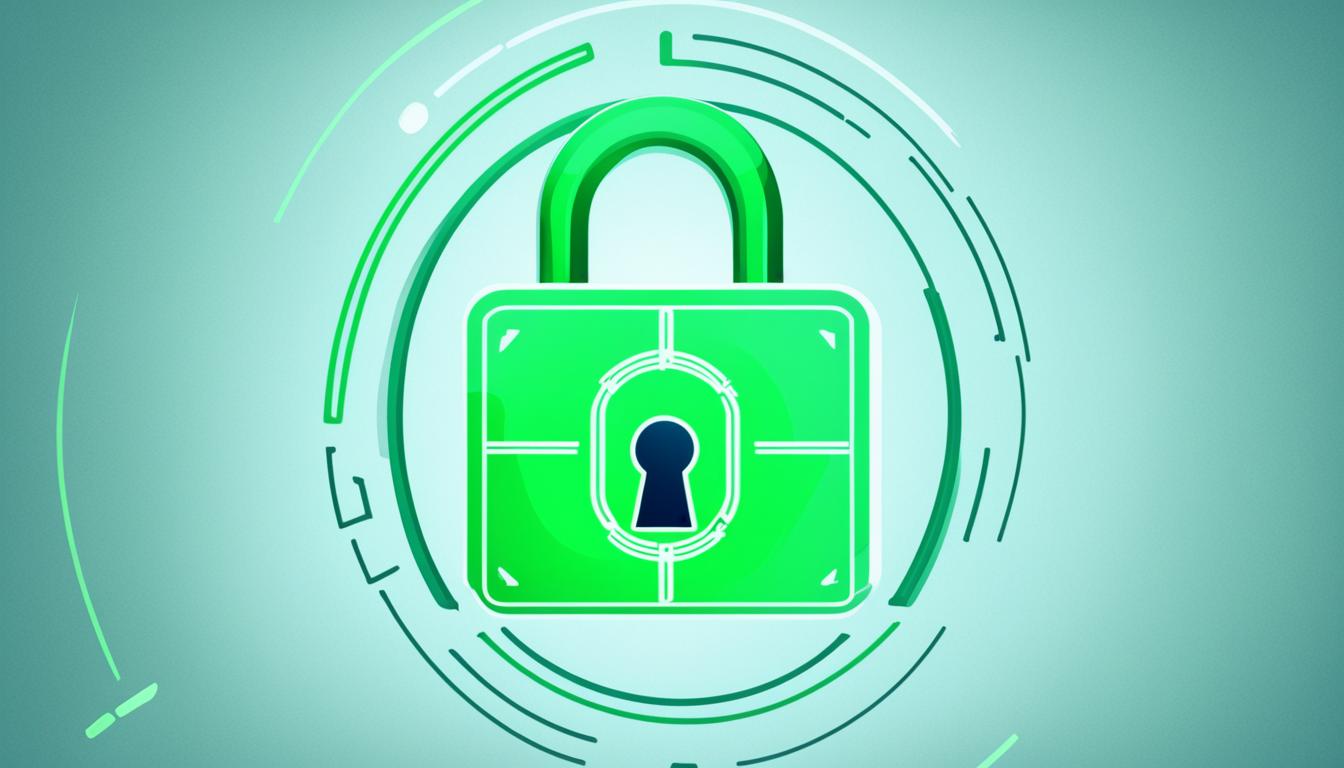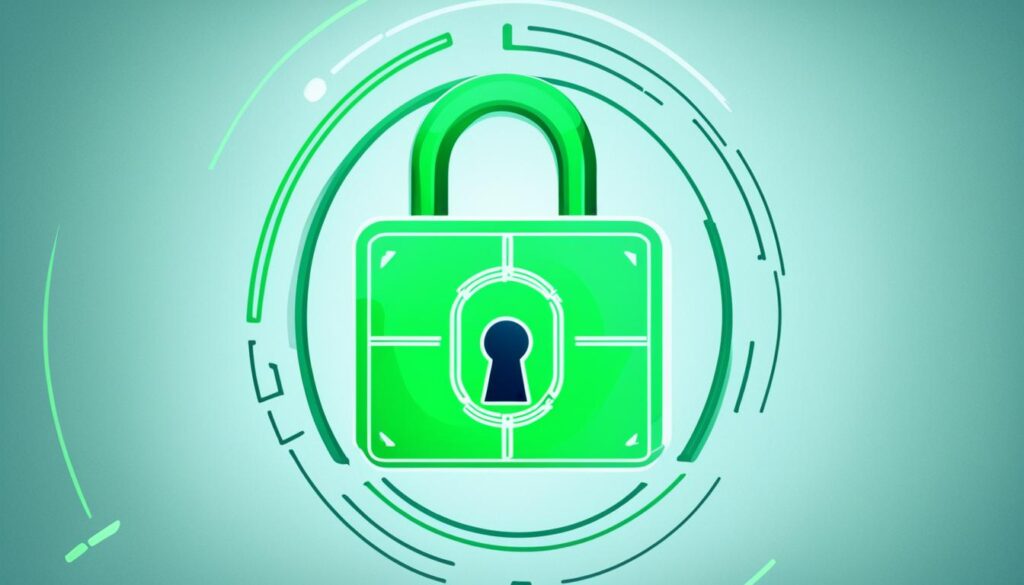Cyber Security for Beginners: Key Concepts and Strategies

Are you a newcomer to the world of cyber security? Are you overwhelmed by all the threats out there? The good news is you can take control and stay safe online. This guide will help you understand cyber security from the ground up. You’ll get the knowledge and tools to protect your digital space.
We’ll start from the basics and move to the essential practices. Everything you need to safeguard your online life is right here. Let’s jump in and learn about the exciting field of cyber security!

Key Takeaways:
- Gain a solid understanding of cyber security basics
- Learn about common types of cybersecurity
- Discover essential cyber hygiene practices
- Understand the importance of data protection
- Find resources to enhance your cyber security knowledge
Understanding Cyber Threats: An Overview for Beginners
Knowing is half the battle when it comes to cybersecurity basics. This section gives a simple overview of common cyber threats. It’s aimed at beginners to help them keep their online world safe.
Learning about these threats will help newbies take steps to stay safe. They’ll be ready to fight off any cyber attacks they might face.
Malware
Malware is any program meant to hurt or use your computer, such as viruses, worms, trojans, and spyware. You might pick up malware by opening the wrong email links or downloading shady stuff online. Having good antivirus software is critical. Make sure to keep it up to date to catch and delete malware.
Phishing
Phishing is when bad guys trick you into sharing info like passwords or credit card numbers. They do this with fake emails or websites that look real. Be careful about clicking unknown links or sharing personal details online.
Adding an anti-phishing tool and staying alert can stop these attacks. Phishing attacks are common, but you can avoid them with some knowledge.
Social Engineering
Cybercriminals use social engineering to trick you into sharing secret info or giving them access. They might pretend to be friends or use mind games to win your trust. It’s wise to keep personal information to yourself, especially on social media.
Always check who you’re dealing with before sharing anything important. This simple step can protect you from many online tricks.
Understanding cyber security is vital for everyone, especially beginners. Knowing the basics helps you be safer online. With some knowledge, you can enjoy the internet without fear of cyber threats.
Essential Cyber Hygiene Tips for Beginners
Good cyber hygiene is vital for everyone, especially newcomers. Put into practice, these tips will shield you online and help keep you safe from cyber dangers. Now, let’s look at some key ideas and simple steps for beginners in cybersecurity.
Create Strong Passwords
Begin with solid and uncommon passwords for each account. Don’t pick obvious ones like “123456” or your pet’s name. Instead, mix letters, numbers, and symbols. A trusted password manager can support you. It safely keeps and organizes your passwords.
Enable Two-Factor Authentication
Use two-factor authentication for an extra security layer. It asks for both a password and a unique mobile code. Could you turn it on wherever you can? This makes your accounts more secure.
Regularly Update Software
Up-to-date software and devices are essential to cyber safety. Constantly update your OS, browsers, and apps to ensure you have the latest defenses against threats.
Backup Your Important Data
Backing up data lessens the impact of cyber attacks or crashes. Save your files on external drives or the cloud. With a backup, you can recover data if the worst happens.
Stay Educated with Beginner Cyber Security Guide
Learning is crucial for beginners in cyber security. Start with beginner guides, courses, and trusted sources like Ark Solvers. Staying informed about threats and best practices helps you stay safe.
By using these tips and practices, you build a secure online space. Protecting your info and presence becomes simpler. Stay proactive and informed in the digital realm. These steps are your armor against threats.
Data Protection Basics: Safeguarding Your Personal Information
Data protection is critical to staying safe online. Keeping your personal information secure is essential if you’re learning about this. We’ll cover some tips on how to do that easily.
- Encryption: Protecting Your Data
Encryption turns your data into a complex code. This makes it safer, even if someone tries to steal it. Always use encryption when sending important info online, like passwords.
- Secure Online Transactions: Protecting Your Financial Information
Check the site using HTTPS and a secure payment method for online shopping. Never share your credit card details over email or on non-secure sites.
- Avoid Oversharing Personal Information on Social Media
Social media is great for staying in touch, but be careful what you share. Please Don’t post personal details, like your phone number, as it can make you a target.
- Regularly Update Your Software and Devices
Always keep your software up to date. Updates often fix security holes. Turn on auto-updates or check for them regularly.
- Be Wary of Suspicious Emails and Messages
Watch out for phishing emails that try to obtain your personal information. If an email looks sketchy, wait to open it, and don’t click any links. Verify requests for information first.
- Use Strong and Unique Passwords
Strong passwords help keep your accounts safe. Mix upper and lowercase letters, numbers, and symbols. A password manager can help if you have trouble remembering them.
- Enable Two-Factor Authentication (2FA)
Use 2FA to add a layer of security to your accounts. It means you need a temporary code, not just your password. This makes it harder for bad actors to get in.
- Backup Your Data Regularly
It’s crucial to back up your data often. Save your files in multiple places, like an external hard drive and the cloud. This way, you won’t lose data if something happens to your device.
Following these tips and staying updated on cyber security will help keep your info safe. Being aware and proactive is critical to online safety.

Building Cyber Security Awareness: Educating Yourself and Others
Learning about cyber security is critical, especially for newbies. Cyber threats are on the rise, and keeping yourself and others safe from these attacks is essential. We’ll find ways to learn and spread the word about cybersecurity.
Reputable Online Resources
Several online resources help people boost their cyber security knowledge. Check out sites like the Cybersecurity and Infrastructure Security Agency (CISA), the National Cyber Security Alliance (NCSA), and the Security Education Companion. They cover the basics, best practices, and what’s happening. Visiting these sites often keeps you in the loop on threats and teaches you valuable lessons.
Awareness Campaigns
Awareness campaigns are essential in teaching cybersecurity to everyone, not just newbies. Groups like Ark Solvers host events all year round. They teach about risks, safe habits online, and new dangers. Joining these events helps newbies get practical skills and develop a safety-first mindset.
Training Programs
There are training programs that provide a solid start in cyber security for beginners. They cover basic topics like staying clean online, secure emails, and more. If you prefer more active learning, check out friendly courses online or in real classes. These let you practice and see how to use what you’ve learned in real-life situations.
Getting savvy about cyber security isn’t just for isn’t spreading the word; you help make the digital world safer for all. Stick to good habits, like staying alert, and push others to care about cyber security, too. Working together, we make a strong front against cyber dangers.
Implementing Cyber Security in Your Daily Life: Practical Tips for Beginners
Cyber security is essential for everyone, especially beginners. It’s crucial to Follow simple tips every day to stay safe online. These steps will help you build a good defense and protect your digital life.
Secure Your Wi-Fi Networks
Start by securing your Wi-Fi network to keep your online activities private. Change the router’s default router and password. It’s recommended to use WPA2 encryption. Create a strong password with letters, numbers, and special characters.
Use Antivirus Software
It’s vital to have antivirus software on your devices. Choose a well-known program and update it regularly. This keeps your devices safe from malware and other dangers.
Be Cautious with Email Attachments
Be careful with email attachments, especially from unknown senders. Always check the sender’s authenticity of the file’s content. Files can easily be hidden in email attachments sent by cybercriminals.
Practice Safe Online Browsing
When browsing, be careful about the sites and links you click on. Stick to well-known websites for personal or financial transactions. Avoid unknown links and pop-up ads that could be harmful.
Regularly Update Software
Keep all your software up to date, including apps and browsers. Updates often contain crucial security fixes. If possible, turn on automatic updates to always have the latest protection.
Use Strong and Unique Passwords
Create unique, strong passwords for each of your accounts. Avoid common or easily guessable words. A password manager can help you keep track of complex passwords safely.
Be Mindful of Social Media Privacy
Continually review and adjust your social media privacy settings. Try not to share too much personal information publicly. Regularly check your friends and followers list to keep it safe and trustworthy.
Educate Yourself and Stay Informed
Stay current on cyber security by learning from trusted online sources and security blogs. Knowledge is the best defense against new cyber threats. Stay informed to protect yourself well.
These simple tips will make a big difference in your online safety. Remember always to be careful and keep learning. Cyber security is an ongoing effort that keeps you safe online.
| Cyber Security Tips for Beginners | |
| Secure Your Wi-Fi Networks | Change default credentials and enable encryption |
| Use Antivirus Software | Install reliable antivirus software and keep it updated |
| Be Cautious with Email Attachments | Verify sender identity and avoid opening suspicious attachments |
| Practice Safe Online Browsing | Stick to reputable websites and avoid clicking on suspicious links |
| Regularly Update Software | Keep software updated to patch vulnerabilities |
| Use Strong and Unique Passwords | Create strong, unique passwords and consider using a password manager |
| Be Mindful of Social Media Privacy | Review privacy settings and be cautious about sharing personal information |
| Educate Yourself and Stay Informed | Continuously educate yourself about cyber security best practices and stay updated |
Conclusion
This guide has given beginners key concepts and strategies for cyber security. You can begin to protect yourself online. It’s about learning the basics, using key cyber security practices, and keeping up with new threats.
By doing this, you’ll make your life safer. Stay informed and protect your digital footprint.
FAQ
What is cyber security?
Cyber security is all about keeping electronic devices safe. This means protecting your phones, computers, and their information from bad guys. These bad guys might use different tricks, like putting harmful software on your device or trying to guess your passwords.
Why is cyber security important for beginners?
Beginners are often easier targets for cyber attacks. This is because they might need to learn to protect themselves online well. Learning some basic cyber security can help keep your stuff safe.
What are some common cyber threats beginners should be aware of?
There are several threats beginners should watch out for. These include malware, phishing, social engineering, and ransomware. Malware is software designed to hurt your computer or to spy on you. Phishing happens when someone tries to trick you into giving them personal information. Social engineering is when people trick you into doing things or giving out information. Ransomware holds your files hostage until you pay a fee to get them back.
What are some beginner-friendly cybersecurity practices?
Beginners can start by creating strong, unique passwords. Adding two-factor authentication to accounts can also help. Additionally, keeping all devices and programs up to date is essential. Don’t click on suspicious links or downloads. Always back up important data, and be careful when sharing personal details online.
How can beginners protect their personal information?
Protecting personal info starts with encrypting sensitive data. Always use secure and encrypted online connections. Be careful about what personal details you share on social media. Avoid giving out unnecessary personal info online.
How can beginners educate themselves and others about cyber security?
To learn more, beginners can check out trusted online resources and participate in cybersecurity training. Webinars and online cybersecurity discussions are also great. Platforms and forums provide vast information to establish a good understanding of cyber security.
What are some practical tips for implementing cyber security in daily life?
Strong passwords are a significant first step in keeping Wi-Fi networks safe. Antivirus software is another essential. Always be careful with email attachments and links. Safe online habits, like not clicking on suspicious sites, are crucial. Finally, regularly updating your devices and software is critical.
Where can beginners find resources and tools for learning cybersecurity?
To learn cyber security, beginners can use online courses or educational platforms. They can also join forums and communities focused on the topic. Many reputable websites and organizations offer learning materials and tools to boost cybersecurity knowledge.


